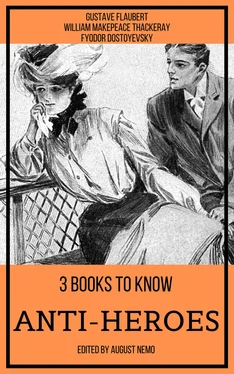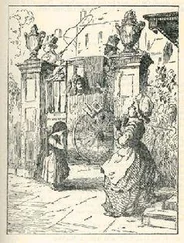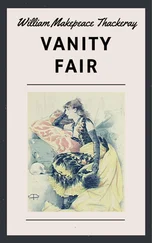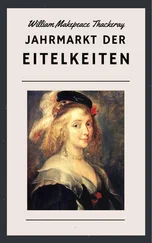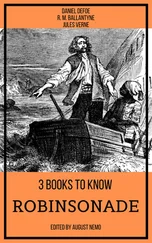I had always a taste for men of letters, and perhaps, if the truth must be told, have no objection to playing the fine gentleman and patron among the wits. Such people are usually needy, and of low birth, and have an instinctive awe and love of a gentleman and a laced coat; as all must have remarked who have frequented their society. Mr. Reynolds, who was afterwards knighted, and certainly the most elegant painter of his day, was a pretty dexterous courtier of the wit tribe; and it was through this gentleman, who painted a piece of me, Lady Lyndon, and our little Bryan, which was greatly admired at the Exhibition (I was represented as quitting my wife, in the costume of the Tippleton Yeomanry, of which I was major; the child starting back from my helmet like what-d’ye-call’im—Hector’s son, as described by Mr. Pope in his ‘Iliad’); it was through Mr. Reynolds that I was introduced to a score of these gentlemen, and their great chief, Mr. Johnson. I always thought their great chief a great bear. He drank tea twice or thrice at my house, misbehaving himself most grossly; treating my opinions with no more respect than those of a schoolboy, and telling me to mind my horses and tailors, and not trouble myself about letters. His Scotch bear-leader, Mr. Boswell, was a butt of the first quality. I never saw such a figure as the fellow cut in what he called a Corsican habit, at one of Mrs. Cornely’s balls, at Carlisle House, Soho. But that the stories connected with that same establishment are not the most profitable tales in the world, I could tell tales of scores of queer doings there. All the high and low demireps of the town gathered there, from his Grace of Ancaster down to my countryman, poor Mr. Oliver Goldsmith the poet, and from the Duchess of Kingston down to the Bird of Paradise, or Kitty Fisher. Here I have met very queer characters, who came to queer ends too: poor Hackman, that afterwards was hanged for killing Miss Reay, and (on the sly) his Reverence Doctor Simony, whom my friend Sam Foote, of the ‘Little Theatre,’ bade to live even after forgery and the rope cut short the unlucky parson’s career.
It was a merry place, London, in those days, and that’s the truth. I’m writing now in my gouty old age, and people have grown vastly more moral and matter-of-fact than they were at the close of the last century, when the world was young with me. There was a difference between a gentleman and a common fellow in those times. We wore silk and embroidery then. Now every man has the same coachmanlike look in his belcher and caped coat, and there is no outward difference between my Lord and his groom. Then it took a man of fashion a couple of hours to make his toilette, and he could show some taste and genius in the selecting it. What a blaze of splendour was a drawing-room, or an opera, of a gala night! What sums of money were lost and won at the delicious faro-table! My gilt curricle and out-riders, blazing in green and gold, were very different objects from the equipages you see nowadays in the ring, with the stunted grooms behind them. A man could drink four times as much as the milksops nowadays can swallow; but ‘tis useless expatiating on this theme. Gentlemen are dead and gone. The fashion has now turned upon your soldiers and sailors, and I grow quite moody and sad when I think of thirty years ago.
This is a chapter devoted to reminiscences of what was a very happy and splendid time with me, but presenting little of mark in the way of adventure; as is generally the case when times are happy and easy. It would seem idle to fill pages with accounts of the every-day occupations of a man of fashion,—the fair ladies who smiled upon him, the dresses he wore, the matches he played, and won or lost. At this period of time, when youngsters are employed cutting the Frenchmen’s throats in Spain and France, lying out in bivouacs, and feeding off commissariat beef and biscuit, they would not understand what a life their ancestors led; and so I shall leave further discourse upon the pleasures of the times when even the Prince was a lad in leading-strings, when Charles Fox had not subsided into a mere statesman, and Buonaparte was a beggarly brat in his native island.
Whilst these improvements were going on in my estates,—my house, from an antique Norman castle, being changed to an elegant Greek temple, or palace—my gardens and woods losing their rustic appearance to be adapted to the most genteel French style—my child growing up at his mother’s knees, and my influence in the country increasing,—it must not be imagined that I stayed in Devonshire all this while, and that I neglected to make visits to London, and my various estates in England and Ireland.
I went to reside at the Trecothick estate and the Polwellan Wheal, where I found, instead of profit, every kind of pettifogging chicanery; I passed over in state to our territories in Ireland, where I entertained the gentry in a style the Lord Lieutenant himself could not equal; gave the fashion to Dublin (to be sure it was a beggarly savage city in those days; and, since the time there has been a pother about the Union, and the misfortunes attending it, I have been at a loss to account for the mad praises of the old order of things, which the fond Irish patriots have invented); I say I set the fashion to Dublin; and small praise to me, for a poor place it was in those times, whatever the Irish party may say.
In a former chapter I have given you a description of it. It was the Warsaw of our part of the world: there was a splendid, ruined, half-civilised nobility, ruling over a half-savage population. I say half-savage advisedly. The commonalty in the streets were wild, unshorn, and in rags. The most public places were not safe after nightfall. The College, the public buildings, and the great gentry’s houses were splendid (the latter unfinished for the most part); but the people were in a state more wretched than any vulgar I have ever known: the exercise of their religion was only half allowed to them; their clergy were forced to be educated out of the country; their aristocracy was quite distinct from them; there was a Protestant nobility, and in the towns, poor insolent Protestant corporations, with a bankrupt retinue of mayors, aldermen, and municipal officers—all of whom figured in addresses and had the public voice in the country; but there was no sympathy and connection between the upper and the lower people of the Irish. To one who had been bred so much abroad as myself, this difference between Catholic and Protestant was doubly striking; and though as firm as a rock in my own faith, yet I could not help remembering my grandfather held a different one, and wondering that there should be such a political difference between the two. I passed among my neighbours for a dangerous leveller, for entertaining and expressing such opinions, and especially for asking the priest of the parish to my table at Castle Lyndon. He was a gentleman, educated at Salamanca, and, to my mind, a far better bred and more agreeable companion than his comrade the rector, who had but a dozen Protestants for his congregation; who was a lord’s son, to be sure, but he could hardly spell, and the great field of his labours was in the kennel and cockpit.
I did not extend and beautify the house of Castle Lyndon as I had done our other estates, but contented myself with paying an occasional visit there; exercising an almost royal hospitality, and keeping open house during my stay. When absent, I gave to my aunt, the widow Brady, and her six unmarried daughters (although they always detested me), permission to inhabit the place; my mother preferring my new mansion of Barryogue.
And as my Lord Bullingdon was by this time grown excessively tall and troublesome, I determined to leave him under the care of a proper governor in Ireland, with Mrs. Brady and her six daughters to take care of him; and he was welcome to fall in love with all the old ladies if he were so minded, and thereby imitate his stepfather’s example. When tired of Castle Lyndon, his Lordship was at liberty to go and reside at my house with my mamma; but there was no love lost between him and her, and, on account of my son Bryan, I think she hated him as cordially as ever I myself could possibly do.
Читать дальше
